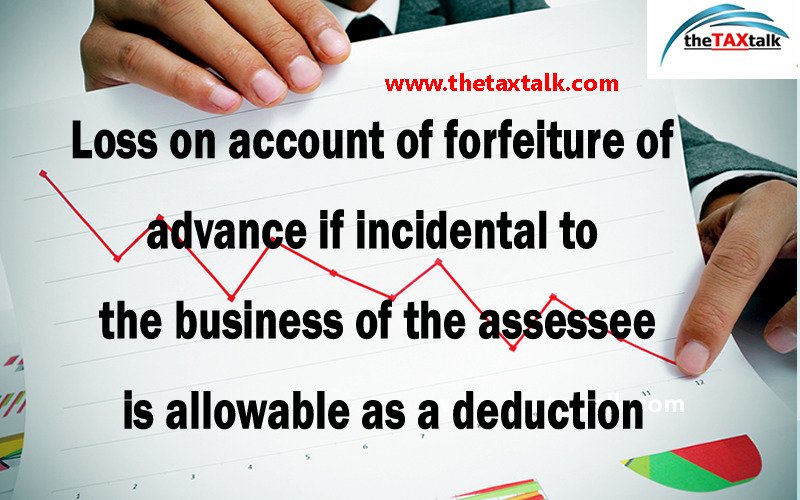![]()
Loss on account of forfeiture of advance if incidental to the business of the assessee is allowable as a deduction
Short Overview Loss on account of forfeiture of advance paid to the customer is incidental to the business of the assessee and is allowable as a deduction under section 37(1) or under section 28 of the Act.
Assessee filed return of income declaring Nil income. Assessment was completed under section 143(3) of the Act accepting the return of income filed by the assessee. The Commissioner, in exercise of the powers under section 263, was of the view that the order of AO was erroneous and prejudicial to the interest of Revenue on the ground inter alia that a sum of Rs 50 lakh debited towards advances written off in P&L, was not allowable as expenditure. The assessee submitted that the advance paid by it was forfeited, hence the expenses were in connection with the business was rightly allowed as deduction by the AO.
It is held that The conclusion of the CIT is based on the reading of the different clauses of the MoU. The parties are at liberty to agree on terms even contrary to the MoU dated 1-5-2007. Shri. Rakesh Rastogi forfeited a sum in question and the same was accepted by the assessee. The fact that the assessee could have disputed and challenged the action of Shri. Rakesh Rastogi in forfeiting the sum of Rs. 50 lakhs and the failure of the assessee to do so cannot be the basis to conclude that there was no business necessity or legal compulsion on the part of the assessee to have allowed a sum of Rs. 50 lakhs to be forfeited by Mr. Rakesh Rastogi. It cannot also be said that the advances given by the assessee to Mr. Rakesh Rastogi as not for genuine business purposes. There was no material on record to come to such conclusion. The expenditure in question has been incurred for the purpose of business as the same was paid to Mr. Rakesh Rastogi for acquiring properties in Delhi for construction of a SEZ. The assessee is in the business of property development and it cannot be said that the advance given to Mr. Rakesh Rastogi is not for the purposes of business of the assessee. The circumstances pointed out by the CIT cannot be a ground to come to a conclusion that the advances given were not for genuine business purposes. The loss on account of forfeiture of advance paid to Mr. Rakesh Rastogi is incidental to the business of the assessee and is allowable as a deduction under section 37(1) or under section 28 of the Act.
Decision: In favour of Assessee
IN THE ITAT, BANGALORE BENCH
N.V. VASUDEVAN, V.P. & CHANDRA POOJARI, A.M.
Divyasree Holdings (P) Ltd. v. Pr. CIT
ITA No. 693/Bang/2016
18 January, 2021
Assesseee by: Narendra Sharma, Advocate
Revenue by: Pradeep Kumar, CIT(DR)(ITAT), Bangalore
ORDER


